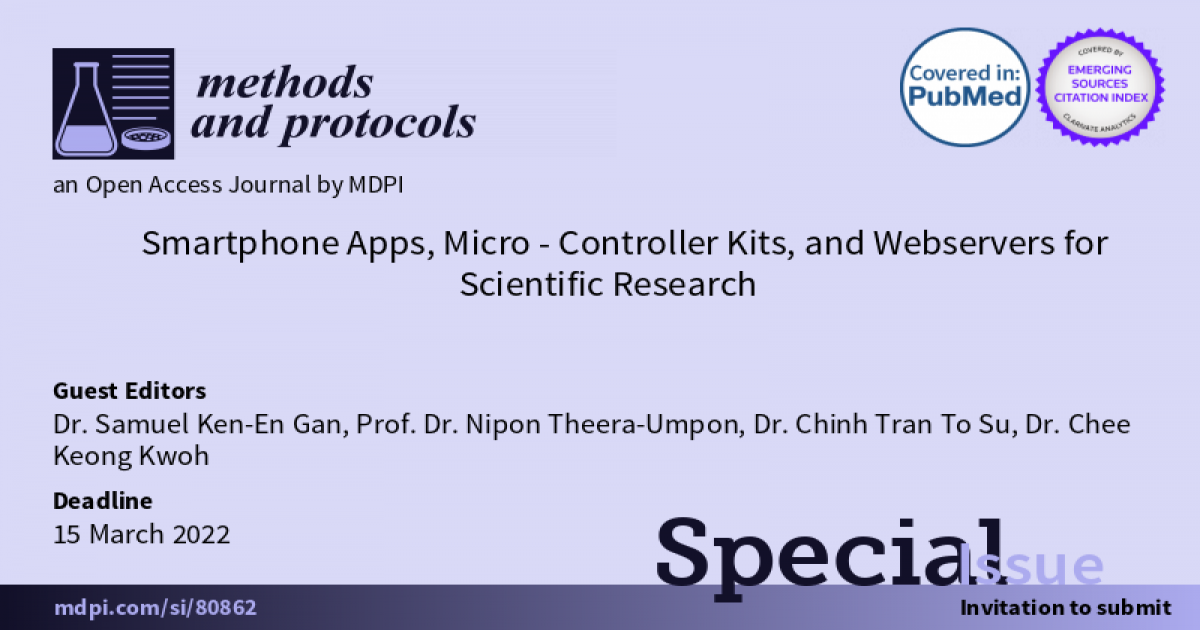Smartphone Apps, Micro-Controller Kits, and Webservers for Scientific Research
A special issue of Methods and Protocols (ISSN 2409-9279).
Deadline for manuscript submissions: closed (15 March 2022) | Viewed by 4682

Special Issue Editors
Interests: Virology; molecular methods; protein engineering; allergology
2. Biomedical Engineering Institute, Chiang Mai University, Chiang Mai 50200, Thailand
Interests: pattern recognition; digital image processing; neural networks; fuzzy sets and systems; big data analysis; data mining; medical signal and image processing
Special Issues, Collections and Topics in MDPI journals
Interests: antibody structural modeling; HIV drug resistance; computational structural biology
Interests: inter-related and interdependent domains; health and learning-related applications; bioinformatics and biomedical engineering
Special Issue Information
Dear Colleagues,
The smartphone revolution along with the micro-controller kits like Arduino, Raspberry Pi, and Micro:Bit have changed the way scientific research can be carried out just as the Internet did a decade earlier. Computers are not indispensable in research labs, and it is foreseeable that smartphone apps and micro-controller kit devices will continue to gain traction. This Special Issue allows the reporting of self-assembled micro-controller kit devices, smartphone apps, and even web servers and their usage for augmenting scientific research.
Reporting should be about how these solutions are developed and what processes they enable or optimize. In certain cases, the novel usage of such solutions to make scientific research easier can also be reported. This Special Issue aims to capture the problem-solving “do-it-yourself” (DIY) spirit in scientists in their various disciplines concerning different issues. The problem or issue identified should be of sufficient commonality to research in the respective disciplines and the advantages of the new method or protocol should be highlighted including but not limited to cost-effectiveness.
Dr. Samuel Ken-En Gan
Dr. Nipon Theera-Umpon
Dr. Chinh Tran To Su
Dr. Chee Keong Kwoh
Guest Editors
Manuscript Submission Information
Manuscripts should be submitted online at www.mdpi.com by registering and logging in to this website. Once you are registered, click here to go to the submission form. Manuscripts can be submitted until the deadline. All submissions that pass pre-check are peer-reviewed. Accepted papers will be published continuously in the journal (as soon as accepted) and will be listed together on the special issue website. Research articles, review articles as well as short communications are invited. For planned papers, a title and short abstract (about 100 words) can be sent to the Editorial Office for announcement on this website.
Submitted manuscripts should not have been published previously, nor be under consideration for publication elsewhere (except conference proceedings papers). All manuscripts are thoroughly refereed through a single-blind peer-review process. A guide for authors and other relevant information for submission of manuscripts is available on the Instructions for Authors page. Methods and Protocols is an international peer-reviewed open access semimonthly journal published by MDPI.
Please visit the Instructions for Authors page before submitting a manuscript. The Article Processing Charge (APC) for publication in this open access journal is 1800 CHF (Swiss Francs). Submitted papers should be well formatted and use good English. Authors may use MDPI's English editing service prior to publication or during author revisions.
Keywords
- smartphone apps
- Arduino
- Raspberry Pi
- Micro:bit
- webserver
- problem-solving
- DIY
Benefits of Publishing in a Special Issue
- Ease of navigation: Grouping papers by topic helps scholars navigate broad scope journals more efficiently.
- Greater discoverability: Special Issues support the reach and impact of scientific research. Articles in Special Issues are more discoverable and cited more frequently.
- Expansion of research network: Special Issues facilitate connections among authors, fostering scientific collaborations.
- External promotion: Articles in Special Issues are often promoted through the journal's social media, increasing their visibility.
- e-Book format: Special Issues with more than 10 articles can be published as dedicated e-books, ensuring wide and rapid dissemination.
Further information on MDPI's Special Issue polices can be found here.






